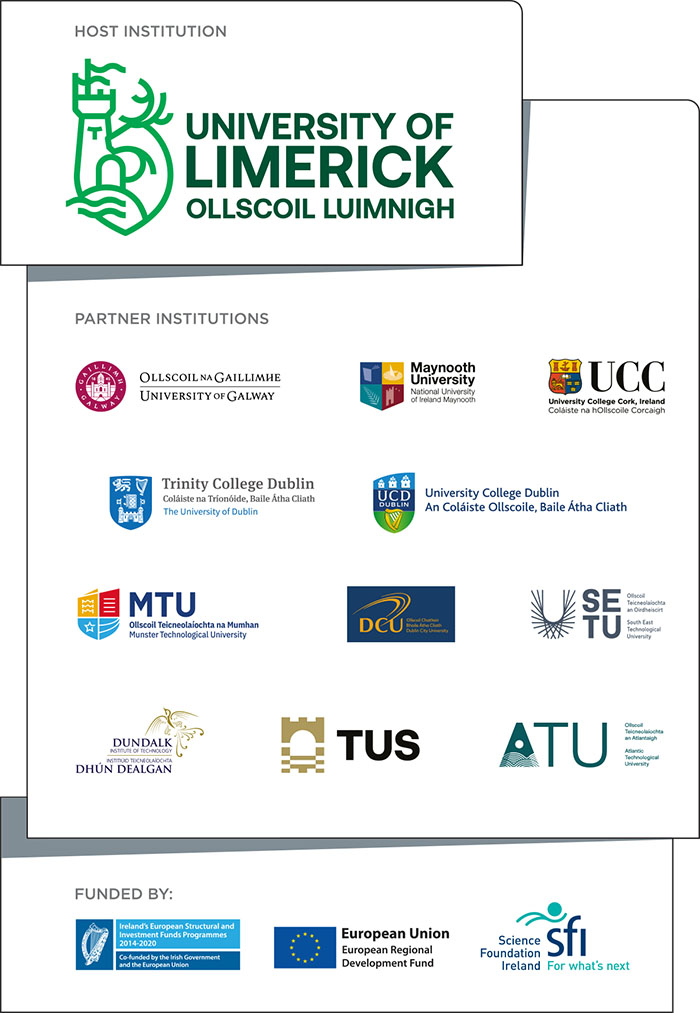Minister announces €37m investment in Lero
You are here
Minister for Further and Higher Education, Research, Innovation and Science, Simon Harris TD today announced an investment of €193 million in five SFI Research Centres for a further six years. This investment by Science Foundation Ireland will support approximately 1,060 graduate and Post-Doctoral students and Research Fellows employed by the Centres.
Lero, the Science Foundation Ireland Research Centre for Software, headquartered at University of Limerick, is to receive more than €37 million of funding over the next six years following robust international peer reviews of its performance to date and its plans for the future.
Announcing the investment, Minister Harris said “I am delighted to announce this significant Government investment in five SFI Research Centres, which reflects Ireland’s position as a world leader in research and innovation. The investment will ensure that we are prepared for the changes and disruption that we are facing in addressing global societal and economic challenges”.
An Economic Impact Study, carried out by the Kemmy Business School in 2019, found that between 2005 and 2018, every €1 invested by the State and industry in Lero contributed more than €5 to the economy.
Director of Lero, Professor Brian Fitzgerald, said this latest round of funding from Science Foundation Ireland, backed by matching support from Lero’s industry partners, will enable Lero to continue to lead the way in establishing Ireland as a location synonymous with world-class software research and development.
“Ireland’s future social, economic and industrial successes are dependent on Ireland being a world-leading developer of software. This latest vote of confidence in Lero’s 300-plus team of researchers throughout the country will play a crucial role in keeping Ireland at the forefront of software development and design. A core research area for Lero is delivering responsible innovation by addressing ethical standards with respect to privacy, trust, inclusion and fairness,” he added.
Lero’s research over the next six years will focus on systems, methods and context with the centre also identifying six strategic application domains.
Lero’s focus has shifted from stand-alone systems to being able to deliver connected cyber-physical-social systems which should be autonomous and adaptive to the run-time environment.
Methods, is concerned with the question of how systems are built, and here, Lero has evolved from plan-driven, waterfall approaches to agile, continuous processes inspired by lean flow concepts. This also leverages communities and ecosystems inspired by the open source philosophy, with the requirement to deliver dependable software at scale.
The third strand, Context, addresses Lero’s concern with the world we want in term of the values to which we aspire, and reflects the need to move beyond satisfaction of technical requirements to ensure that systems meet ethical standards with respect to privacy, trust, inclusion and fairness, and also delivering responsible innovation.
Lero has also strategically targeted six areas in which significant disruption potential exists that can be underpinned by Lero research and which have strong relevance for Ireland in terms of industry base, research priorities, and EU funding opportunities. These are Connected Autonomous Vehicles, Smart Commities/Cities, FinTech, Health Wellbeing and Human Performance, GovTech, and AgriTech and Food. Lero is home to Ireland’s first esports science research laboratory located at its headquarters at University of Limerick.
The overall investment in the five centres (Adapt, Connect Cúram, iCrag and Lero) is further backed by significant industry support from 200 industry partners committing over €91 million in cash and in-kind contributions.
Under the new funding model, these SFI Research Centres are successfully scaling up to secure 67% of the funding from other sources, so only 33% of their funding over the six years will now come from Science Foundation Ireland. This model will drive significantly more leveraged funding from non-SFI sources, so that each €1 invested will result in a further €2 co-investment.
“SFI Research Centres promote discovery and impact, as well as collaboration between academia, government and industry across the Island of Ireland and internationally. This support will further enhance the important work these Centres have already achieved, so they continue to play a pivotal role in the years ahead in protecting the wellbeing of the population and the economy,” Minister Harris added.
Speaking at the announcement, Prof Mark Ferguson, Director General Science Foundation Ireland and Chief Scientific Adviser to the Government of Ireland, said: “To maintain and build on Ireland’s global standing in research, innovation, and discovery, it is crucial that we invest in excellent ideas and research with impact. SFI Research Centres support both basic and applied research, spanning a wide range of sectors at varying levels and stages, and as a country we have benefited from their considerable contributions in the recent Covid-19 pandemic”.
“They have made transformational progress in just six years, with increased academic and industrial collaboration, extensive training of PhD students for future skills needs, winning competitive funding from the EU, producing excellent scientific results and driving vital public engagement. We look forward to further strengthening our ability to positively impact our society and economy through excellent scientific research, with continued support from the Government and industry in the years ahead.”
Across the five centres, the 200 industry collaborators will include multinational companies (47%), SMEs (32%) and other consortium groups (21%) based in Ireland and internationally.
The five SFI Research Centres will also work to promote science, technology, engineering and maths (STEM) to the wider public through extensive Education and Public Engagement outreach. These initiatives include summer computer camps, supporting teacher continued professional development, developing secondary school education modules, and residency programmes for filmmakers, artists and teachers to forge collaborations between researchers and the community.
Awards of funding to SFI Research Centres are made following rigorous international expert peer reviews.




